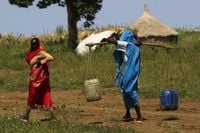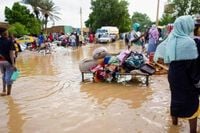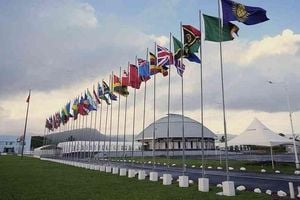Sudan, a nation already battered by more than two years of relentless civil war, now finds itself gripped by an escalating humanitarian catastrophe. In the city of El-Fasher, the largest urban center in Darfur, violence and siege have become the grim backdrop of daily life, while flash floods and famine threaten other regions, compounding the suffering of millions. The United Nations and local medical networks have sounded the alarm, warning that the country stands on the precipice of a disaster with no immediate political solution in sight.
For over 500 days, El-Fasher has been under siege, trapping hundreds of thousands of civilians as the Sudanese army and the Rapid Support Forces (RSF) wage a brutal conflict. According to the UN Secretary-General Antonio Guterres, the situation has reached a critical point. "The Secretary-General is appalled by the relentless attacks by the Rapid Support Forces on El-Fasher in Sudan's North Darfur," his spokesperson Stephane Dujarric stated on Friday, reflecting the deepening concern within the international community. The city has endured near-continuous shelling and repeated deadly assaults on the Abu Shouk displacement camp, where famine conditions were identified late last year, as reported by the UN.
Recent weeks have brought a surge in violence. Since August 11, 2025, the United Nations has documented at least 125 civilian deaths in the El-Fasher area, including summary executions. However, the actual death toll is likely higher, given the chaos and the difficulty of accurate reporting. The Sudan Doctors Network, a respected local medical group, announced that on August 27 alone, 24 civilians were killed and 55 injured—including five women—after intense artillery shelling by the RSF targeted the central market and the Awlad Al-Rif neighborhood in the city center.
The El-Fasher Resistance Committees Coordination, a grassroots civil society group, confirmed that the city faces daily barrages of shells raining down on markets and residential areas. The result has been dozens of deaths and injuries each day, with the population trapped in a "catastrophic humanitarian condition characterized by a lack of food and medicine, and a near-total collapse of the health system." A military source described the RSF's tactics: "The Rapid Support Forces primarily rely on intensive artillery shelling, which begins early in the morning and continues until evening. Each wave of shelling includes hundreds of shells, leading to more civilian casualties each time."
Humanitarian aid efforts have been hampered by repeated attacks on personnel and assets in North Darfur, the UN reported. Supplies are pre-positioned nearby, but the ongoing violence makes it nearly impossible for aid workers to move them into El-Fasher. The UN chief called for "an immediate ceasefire in and around the El-Fasher area," urging all parties to protect civilians, ensure the safe delivery of aid, and allow those wishing to leave to do so safely.
On the diplomatic front, the Secretary-General's Personal Envoy, Ramtane Lamamra, continues to engage the warring parties in hopes of supporting a political process. Yet, as of late August 2025, there have been no breakthroughs, and local groups repeatedly accuse the RSF of shelling civilian areas despite international calls to protect humanitarian corridors.
The conflict, which erupted in April 2023, pits the Sudanese army led by Abdel Fattah al-Burhan against the RSF under Mohamed Hamdan Dagalo (commonly known as Hemedti). It has killed thousands and displaced more than 13 million people, making it one of the world’s worst humanitarian crises. The UN Secretary-General has expressed deep concern about "grave risks of serious violations of international humanitarian law as well as violations and abuses of international human rights law, including ethnically motivated ones."
But the tragedy in Sudan is not confined to the battlefield. In the Nile River and Kassala states, heavy rains and flash floods have unleashed a new wave of suffering. Over the past few days, authorities in Nile River state announced the deaths of seven people, injuries to several others, and the collapse of dozens of homes and public facilities in the localities of Al-Damer, Shendi, Atbara, and Al-Zeidab. The government has activated emergency response teams, with the governor personally overseeing damage assessments and the distribution of urgent assistance.
In Kassala state, the Gash River has swelled to alarming levels, isolating entire villages north of the city—most notably the Tandalay area, now completely cut off. Residents have resorted to using small boats to cross floodwaters and access essential services. Initial estimates suggest that about 1,000 families remain trapped by the floods. In response, the Sovereignty Council dispatched a relief plane on August 24, aiming to bolster rescue and emergency operations.
These natural disasters strike at a time when the war has already stretched Sudan’s resources to the breaking point. The United Nations has warned that 17 Sudanese regions, including parts of Darfur, the Nuba Mountains, Khartoum, and Al-Jazeera, are at risk of famine. Without urgent international relief, a broader humanitarian disaster looms. The UN’s warnings are stark: "There have been repeated attacks on humanitarian personnel and assets in North Darfur over recent months," and the risk of famine is growing as aid convoys are unable to reach those most in need.
Sudan’s health system, once fragile but functioning, is now on the verge of total collapse. The combination of daily shelling, siege, and the destruction of infrastructure has left hospitals understaffed, under-resourced, and overwhelmed. Food and medicine are scarce, and for many, the only option is to flee—if they can. Yet, safe passage is far from guaranteed, and many remain trapped in besieged areas, unable to escape the violence or the floods.
Despite the dire situation, there are glimmers of resilience. Civil society groups, medical networks, and local volunteers continue to risk their lives to provide care, document abuses, and call for international attention. The field emergency room in Nile River state is working around the clock, and relief flights to Kassala offer some hope to those stranded by the floods. But these efforts, while heroic, are not enough to stem the tide of suffering without a broader political and humanitarian response.
As Sudan stands "on the brink of the abyss, drowning in blood and water," in the words of local observers, the international community faces mounting pressure to intervene. The UN, through its Secretary-General and Personal Envoy, continues to push for dialogue and a ceasefire. Yet, with no urgent political solutions on the horizon, millions of Sudanese remain caught between war, famine, and disaster, their future uncertain and their needs more pressing than ever.
The story of Sudan today is one of relentless hardship, but also of the enduring spirit of its people—surviving, resisting, and hoping for peace in a land beset by tragedy.





